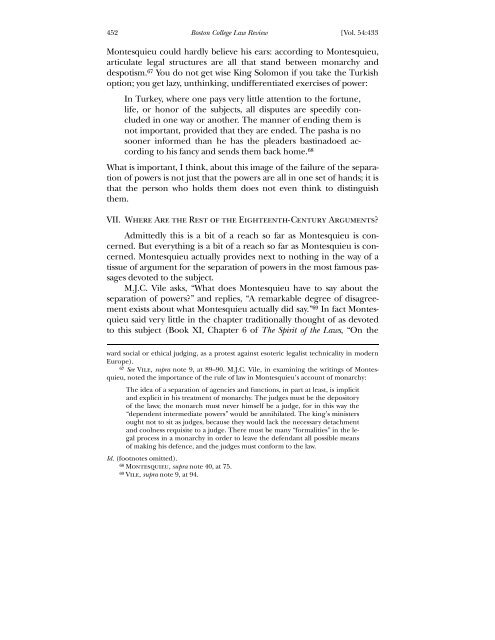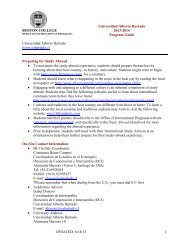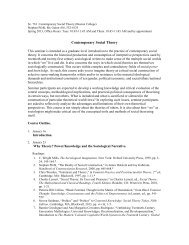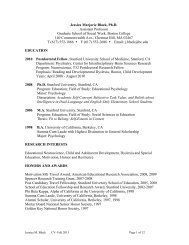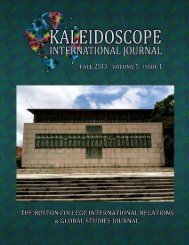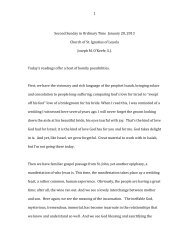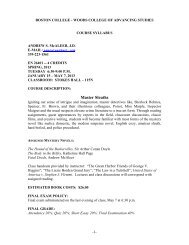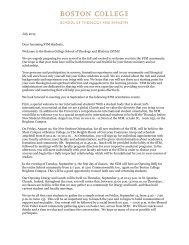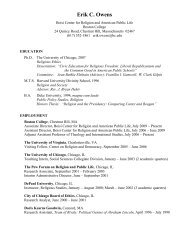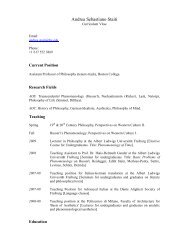separation of powers in thought and practice? - Boston College
separation of powers in thought and practice? - Boston College
separation of powers in thought and practice? - Boston College
Create successful ePaper yourself
Turn your PDF publications into a flip-book with our unique Google optimized e-Paper software.
452 <strong>Boston</strong> <strong>College</strong> Law Review [Vol. 54:433<br />
Montesquieu could hardly believe his ears: accord<strong>in</strong>g to Montesquieu,<br />
articulate legal structures are all that st<strong>and</strong> between monarchy <strong>and</strong><br />
despotism.67 You do not get wise K<strong>in</strong>g Solomon if you take the Turkish<br />
option; you get lazy, unth<strong>in</strong>k<strong>in</strong>g, undifferentiated exercises <strong>of</strong> power:<br />
In Turkey, where one pays very little attention to the fortune,<br />
life, or honor <strong>of</strong> the subjects, all disputes are speedily concluded<br />
<strong>in</strong> one way or another. The manner <strong>of</strong> end<strong>in</strong>g them is<br />
not important, provided that they are ended. The pasha is no<br />
sooner <strong>in</strong>formed than he has the pleaders bast<strong>in</strong>adoed accord<strong>in</strong>g<br />
to his fancy <strong>and</strong> sends them back home.68<br />
What is important, I th<strong>in</strong>k, about this image <strong>of</strong> the failure <strong>of</strong> the <strong>separation</strong><br />
<strong>of</strong> <strong>powers</strong> is not just that the <strong>powers</strong> are all <strong>in</strong> one set <strong>of</strong> h<strong>and</strong>s; it is<br />
that the person who holds them does not even th<strong>in</strong>k to dist<strong>in</strong>guish<br />
them.<br />
VII. Where Are the Rest <strong>of</strong> the Eighteenth-Century Arguments?<br />
Admittedly this is a bit <strong>of</strong> a reach so far as Montesquieu is concerned.<br />
But everyth<strong>in</strong>g is a bit <strong>of</strong> a reach so far as Montesquieu is concerned.<br />
Montesquieu actually provides next to noth<strong>in</strong>g <strong>in</strong> the way <strong>of</strong> a<br />
tissue <strong>of</strong> argument for the <strong>separation</strong> <strong>of</strong> <strong>powers</strong> <strong>in</strong> the most famous passages<br />
devoted to the subject.<br />
M.J.C. Vile asks, “What does Montesquieu have to say about the<br />
<strong>separation</strong> <strong>of</strong> <strong>powers</strong>?” <strong>and</strong> replies, “A remarkable degree <strong>of</strong> disagreement<br />
exists about what Montesquieu actually did say.”69 In fact Montesquieu<br />
said very little <strong>in</strong> the chapter traditionally <strong>thought</strong> <strong>of</strong> as devoted<br />
to this subject (Book XI, Chapter 6 <strong>of</strong> The Spirit <strong>of</strong> the Laws, “On the<br />
ward social or ethical judg<strong>in</strong>g, as a protest aga<strong>in</strong>st esoteric legalist technicality <strong>in</strong> modern<br />
Europe).<br />
67 See Vile, supra note 9, at 89–90. M.J.C. Vile, <strong>in</strong> exam<strong>in</strong><strong>in</strong>g the writ<strong>in</strong>gs <strong>of</strong> Montesquieu,<br />
noted the importance <strong>of</strong> the rule <strong>of</strong> law <strong>in</strong> Montesquieu’s account <strong>of</strong> monarchy:<br />
The idea <strong>of</strong> a <strong>separation</strong> <strong>of</strong> agencies <strong>and</strong> functions, <strong>in</strong> part at least, is implicit<br />
<strong>and</strong> explicit <strong>in</strong> his treatment <strong>of</strong> monarchy. The judges must be the depository<br />
<strong>of</strong> the laws; the monarch must never himself be a judge, for <strong>in</strong> this way the<br />
“dependent <strong>in</strong>termediate <strong>powers</strong>” would be annihilated. The k<strong>in</strong>g’s m<strong>in</strong>isters<br />
ought not to sit as judges, because they would lack the necessary detachment<br />
<strong>and</strong> coolness requisite to a judge. There must be many “formalities” <strong>in</strong> the legal<br />
process <strong>in</strong> a monarchy <strong>in</strong> order to leave the defendant all possible means<br />
<strong>of</strong> mak<strong>in</strong>g his defence, <strong>and</strong> the judges must conform to the law.<br />
Id. (footnotes omitted).<br />
68 Montesquieu, supra note 40, at 75.<br />
69 Vile, supra note 9, at 94.


